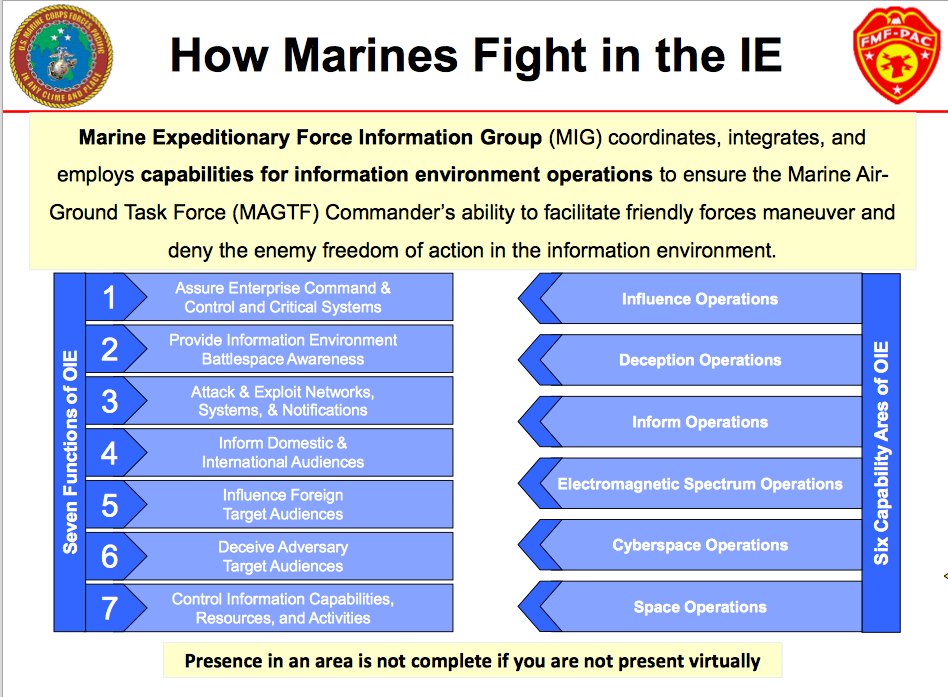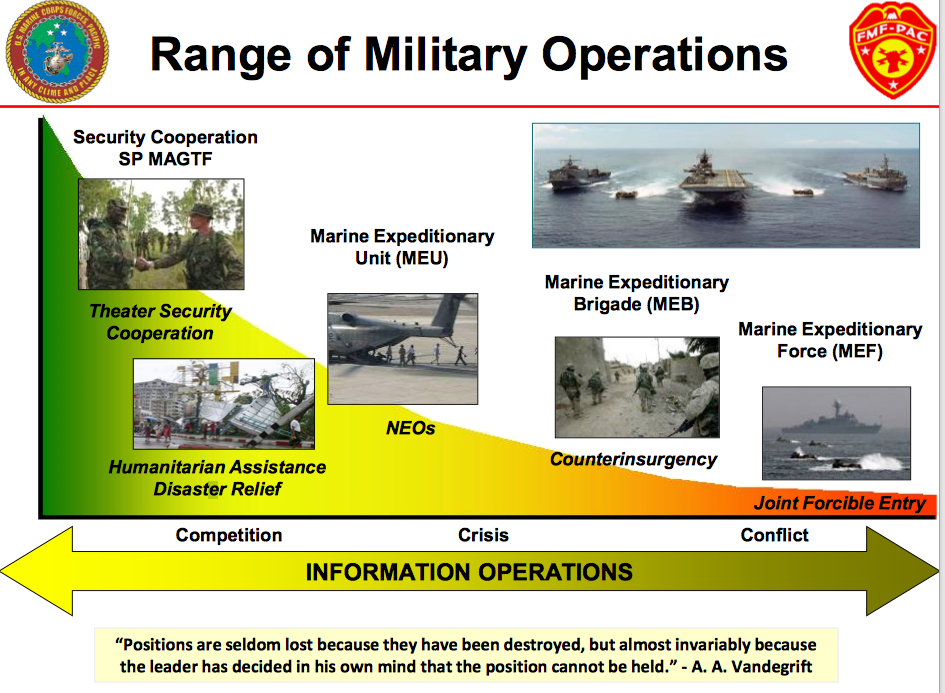Robbin Laird

During my August 2021 visit to MARFORPAC, I had a chance to talk with the specialists in information operations within the command. In particular, I met with Mr. Justin Bogue, Information Maneuver Branch Deputy, Maj. Melissa Giannetto, MARFORPAC PsyOp Officer and Maj. Nick Mannweiler, COMMSTRAT Operations.
Clearly, one major change since my last visit to MARFORPAC in 2014-2015 has been a renewed focus on information operations.
With the Russian seizure of Crimea which involved significant use of information warfare, and the ramp up of information operations including cyber in the Pacific – China, North Korea and Russia – a focus on crisis management operations needs to incorporate information operations as a core capability.
It needs to be, in the words of one participant in the discussion, “not a bolt-on capability but a core integrated capability.”
A key change which the Marines have made to build out modern IO capabilities has been the formation of MEF Information Groups (MIG) in each Marine Expeditionary Force.
And those MIGS are operating as centers of excellence to shape the practical side of information operations, but also as magnets for change throughout the Marine Corps as a whole.
During a visit to 2nd MEF this past summer, I discussed why the formation of the MIGs was so important as part of the reshaping of the Marine Corps capabilities for full spectrum crisis engagement.
As Col. Brian Russell, the Commander of II MEF Information Group put it: “the MIG was borne out of the MEF Headquarters Group here. We had some of the components already, but they were reorganized under a different construct with some different capabilities, like the communication, strategy and operations company. Psychological operations capabilities, defensive cyber capabilities, were packaged in this MEF Information Group.
“I think the key for the MEF Information Group is taking all those capabilities and making them work together rather than having operational silos such as just coms and just intel; we need to work information operations as a whole.”
The participants in the conversation at Camp Smith with the information operations officers underscored Russell’s core point.
It was about forging a coherent capability to build in information operations elements within operations.
As one participant put it: “It has taken time but over the past few years, we have been able to get wider recognition of the importance of information operations for the Marines and there is now much greater practical focus on how to do this more effectively going forward.”
And one aspect of that challenge going forward is working through what the relationship between what has been traditionally called public affairs is with operational information war. Or put another way:
What is the relationship between COMSTRAT and Information Operations?
Another participant underscored that information operations were a key part of how the U.S. and allied militaries operated in the Cold War.
Some of these skill sets need to be recreated but to do so in the digital age and one where cyber war is a key reality as well.
In the briefing given by the information operations team, one slide highlighted “how the Marines fight in the information environment.”
And the focus was upon how the MIG was positioning itself as a core element within the MAGTF to shape a way ahead for integrated information operations.

Because the Marines are full spectrum crisis management force, IO needs to be addressed across the spectrum of operations from HADR ops, to higher end forcible entry operations.
In the briefing, the team highlighted this in the following slide:

With a focus on more joint force integration of the Marines with the Navy, in particular, it was increasingly important that coordination among service-based IO needs to be coordinated, and common approaches and language shaped to execute more effective joint operations.
And IO against peer competitors was at a very different scale than what has been learned and practiced in the Middle East land wars.
Events at the local level in INDOPACOM can become strategic in character rapidly: how best to handle the management of IO at local levels and ensure that they work hand in glove with effective strategic level decisions?
The exercise piece is of growing importance as well.
Training and exercises are becoming of increasing importance in shaping joint and coalition force capabilities. But they are messaging events as well. How to bring these two strands within exercises more effectively together, namely effective combat training and effective political impacts through messaging?
We discussed the crucial importance of collating information and lessons as well learned in crises, exercises or other information operational events.
And here the team highlighted that from the beginning the MIGS are working closely with one another, and there are clear efforts to shape a coordinated community which can indeed share experiences and knowledge gained from those experiences.
No comments:
Post a Comment